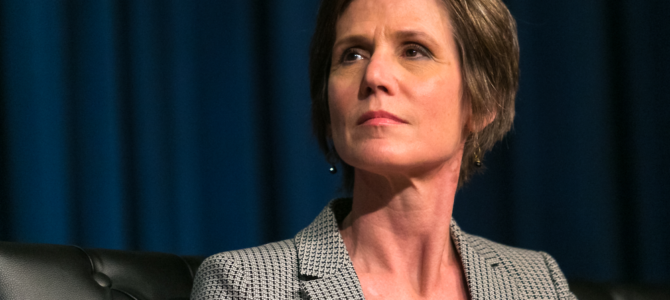Former acting Attorney General Sally Yates testified before the Senate Judiciary Committee on Wednesday about the Russia investigation. During her hours-long testimony, Yates repeated her claim that she feared the Russians had compromised President Donald Trump’s national security adviser Michael Flynn.
“We do not want anybody in the U.S. government to be compromised by a foreign adversary,” Yates told the committee from her Atlanta home during her telephonic testimony, adding, “My great concern was the Russians knew that Gen. Flynn had not only engaged in these back-channel discussions, but that he was misleading and lying about it to the vice president and others.”
Yates had told the Judiciary Committee the same story in May 2017, when she testified, “We believed that Gen. Flynn was compromised with respect to the Russians.” “To state the obvious,” Yates expanded, “you don’t want your national security adviser compromised with the Russians.”
In the interim, however, Americans have learned much more about the Flynn affair, and information declassified since then established that the FBI didn’t fear Flynn was compromised; they fear Flynn. Only a deeply indoctrinated partisan could continue to believe the “compromised” canard.
Thanks to the release of material previously withheld from Flynn’s criminal attorneys, we now know that the FBI agents sought to question Flynn about his phone calls with the Russian ambassador not because they believed he was compromised, but because they wanted him fired or prosecuted. They sought to shore up a nonsensical Logan Act charge or to ensnare Trump’s national security adviser in a perjury trap.
The gambit succeeded when then-FBI agent Peter Strzok and his in-the-shadows partner Joe Pientka questioned Flynn, concluded he wasn’t lying, yet successfully set in motion Flynn’s prosecution by the special counsel’s office. Following their questioning of Flynn, then-FBI Director James Comey did an about-face, now agreeing with Yates that the Trump White House should be briefed on the conversations Flynn had with the Russian ambassador in late December. That briefing led to Flynn’s ouster.
For Yates to continue to claim she believed Flynn was compromised speaks not of Flynn’s character but hers. She has taken the ostrich defense to a new low. Yates continues to ignore the suspicious circumstances under which she first learned of Flynn’s conversations with the Russian ambassador: during a Jan. 5, 2017 meeting when Comey discussed Flynn’s calls with then-President Barack Obama. Yates had no prior knowledge of the calls, blindsiding her so she had a hard time processing the conversation at the time.
Yet we are to believe Yates thought Flynn’s conversations were a back-channel to Russia. But she did nothing to inform President-elect and then President Trump of the conversations until after Comey had sent his FBI agents to question Flynn. We are to believe this talking point even after Strzok’s declassified notes indicated that Comey informed Obama and Vice President Joe Biden that Flynn’s calls with the Russian ambassador “appear legitimate.”
While Yates takes refuge in her claimed concern that Flynn was compromised because he had “lied” to the vice president, FBI notes show agents had no such concern. After interviewing Flynn, the FBI agents also did not believe Flynn had lied about his conversations with the Russian ambassador. Did they tell her otherwise? Did Comey and his crew play Yates?
Frankly, that is too easy of a cop-out. Yates might not be complicit, but she possessed the willful blindness only a true partisan could, to swallow the tale the Resistance peddled: that a retired lieutenant general with top-secret security clearance could be compromised by the Russians so easily.
Americans need to remember that for all her talk of bipartisan service to this country, Yates demonstrated her true blue colors when she refused to enforce Trump’s travel ban, the essence of her job as acting attorney general. Yet Yates also refused to resign, forcing Trump to fire her instead.
That might be a badge of honor for Yates, but her continued refusal to see the soft coup plotted under her leadership of the Department of Justice will be her legacy.
This article has been corrected since publication.









